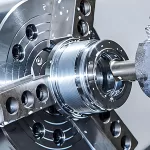The Significance of Quality Standards in Metal Machining Services
Choosing a reliable metal machining service necessitates an understanding of certifications and quality standards that underscore superior quality and reliability in production processes. These standards are the bedrock of trust and assurance for customers seeking impeccable metal fabrication solutions.
Certifications and Quality Standards:
A wide array of certifications and quality standards signifies adherence to stringent guidelines in metal machining. ISO 9001 certification, for instance, ensures compliance with internationally recognized quality management systems, affirming an organization’s commitment to consistent quality. Similarly, AS9100 certification caters specifically to aerospace industry requirements, emphasizing product safety and reliability.
Ensuring Superior Quality:
These standards ensure superior quality by establishing a structured framework for operations. They necessitate meticulous documentation of processes, continuous improvement practices, and stringent quality checks at various stages of production, thus mitigating errors and enhancing product consistency.
Reliability in Production:
The reliability aspect of these certifications ensures that a metal machining service meets or exceeds customer expectations consistently. Adherence to standardized procedures minimizes deviations and ensures the reliability of the end products, meeting precise specifications.
Enhanced Compliance and Safety:
Quality standards contribute to enhanced compliance and safety measures. Certifications such as ISO 14001 focus on environmental management systems, promoting sustainable practices, while adherence to ISO 45001 emphasizes occupational health and safety, fostering a secure work environment.
Competitive Edge:
For metal machining services, possessing relevant certifications provides a competitive edge. They signify a commitment to quality, reliability, and customer satisfaction, establishing credibility in the industry and fostering long-term relationships with clients.
Continuous Improvement Culture:
Quality standards promote a culture of continuous improvement. Processes are regularly reviewed and refined, ensuring that the metal machining service remains abreast of evolving technologies and industry best practices, ultimately enhancing efficiency and product quality.
Choosing the Right Service:
When seeking a metal machining service, evaluating their certifications and adherence to quality standards becomes paramount. Clients should prioritize services that align with their specific industry requirements, ensuring that the chosen service possesses the necessary certifications to meet their quality expectations.
Conclusión:
The significance of certifications and quality standards in metal machining services cannot be overstated. They serve as beacons of trust, ensuring superior quality, reliability, compliance, and a commitment to excellence, ultimately defining the service’s credibility and success.

